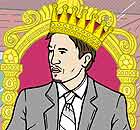Football pundits have long been an upwardly mobile species. This is a hungry breed, a lineage of strident, well-groomed men for whom a sense of sofa-lolling entitlement has recently given way to outright historical ascendancy. This process has been marked by visible changes. In presentational terms there has been an ascent-of-man-style rise from sallow, kipper-tied, brown-suited figures enthroned behind looming wood veneer desks. Through a more recent period of vaulting modernity where the furniture shrunk back, desks became lighted coffee tables, and suddenly knees and even ankles were exposed, stools perched upon daintily, the pundit revealed in his full-frontal glory. Most recently the football pundit has gone a step further, rising up on to his hind legs and striding about the studio, fully erect, conducting with both arms his swooshing super-machines.
This season, change has come in other areas too. This weekend Sky Sports' chief pundit Gary Neville will preside over a Super Sunday triple-decker mega-bill that promises six whole hours of total football-talk. If there is something unusual in this it is that with Neville in the chair it is possible, finally, to actually quite look forward to this bit, those long, idling moments in between where there is no actual football, just the spectacle of men talking urgently about football. Neville has solidified in recent weeks, losing his ferrety callow quality, turning towards the camera instead a full-face belligerence, a relentless and moreish zeal. I think we can say it now: there's a new sheriff in town, a new king-pundit. And maybe the pundit is about to enter another of his furtive growth spurts.
I always secretly liked Neville as a player, too. In his recent book he described his own England career as "a massive waste of time", but it wasn't always like that. Witness for example the notable high of his performance in England's defeat by Argentina at France 98, where Neville surged with bow-legged fury the length of his touchline, a waddling English Cafu. Albeit it was easy to forget all this later on as his interpretation of the role of full-back was increasingly as a form of obstruction, an immobile object to be skirted warily, like a dying dalek.
His waspishness has always been evident, as has a subtle quality of outsiderdom. There is a story about the old lags at United laughing out of their car windows at the sight of the young Neville staying behind after training to practise throw-ins on his own against a wall while they all sidled off to some appalling shag-carpeted lounge bar. And it is this cussed, puritanical, quietly nonconformist brio that is his great asset, a line in quiet iconoclasm that is now being applied to the role of pundit.
It seems increasingly that Neville may be doing actual research; that his approach to punditry may involve a rare desire to actually tell you interesting things you didn't know about football. And amid the bombast of Sky's plastic triumphalism, there is a quality in him of restrained preacherly zeal, the brusqueness of an ambitious young parish curate or a strident Scottish schoolmaster with a flaringly adamant moustache.
There are plenty of other entertaining pundits. I always enjoy watching Robbie Earle, for example, if only for his heroic air of crisis management, the lingering suspicion that he is being held hostage and forced to talk in a slow patient voice about banks of four and midfield runners but is responding with great calm and quiet dignity and will probably win some kind of civilian bravery award when this is all over. I like Jamie Redknapp for his thigh‑chafing eagerness, the burbling stream of consciousness through which nuggets of jangling coherence will suddenly burst and then evaporate in a puppyish confusion. I also like Glenn Hoddle, mainly because he often seems to have wandered in from the world next door where they use words differently and it's normal to say things like: "They've gone backwards-facing. The distances are good, but the movement needs a front-pivot." I even miss John Barnes as an anchorman; he seemed pleasantly argumentative and speaks so rapidly it is as though someone has spilt a glass of water on the autocue keyboard and he is being forced to read out things like "hello and soknonfonnmbnbdjhbdjinocf".
Neville is different, though. Others entertain accidentally, but he is absorbing simply by being himself. I have a theory that one day TV pundits will be considered just as important as managers, driving as they do the great continental engines, the wheezing bellows of football's surging public opinion. Perhaps they already are, judging by André Villas-Boas's carefully strategised public response this week to Neville's amusing suggestion that David Luiz has been playing like he is being "controlled by a 10-year-old in the crowd on a PlayStation".
It is tempting to condemn this overlap between the real and the televised as yet another example of the secondary business of talking about football usurping the real business of actually playing it. But so central are the currents of public perception, so powerful the tidal pressures of televised opinion on top-level football that it seems inevitable the two must eventually coalesce into a twin-headed public theatre. Nasally insistent, relentlessly illuminating, Neville has become oddly unignorable of late. This already sounds like progress.

